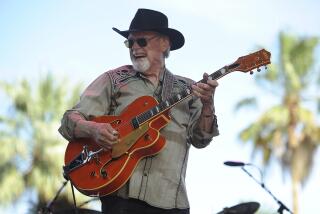JAZZ REVIEW : Saxophonist Edwards Hits Nostalgic Note : Maxwell’s crowd hears re-creation of ‘40s along L.A.’s Central Avenue. Veteran musician plays to a tune’s emotions, rather than putting his technique on display.
HUNTINGTON BEACH — Tenor saxophonist Teddy Edwards brought a bit of Central Avenue to this seaside city Sunday. Edwards, active in the late ‘40s on the Los Angeles avenue’s legendary jazz scene along with such notable saxophonists as Dexter Gordon and Wardell Gray, re-created the sounds of those long-gone days in an afternoon appearance at Maxwell’s when he struck up his own “Symphony on Central.”
The tune, pulled from Edwards’ recent “Mississippi Lad” recording--his first on a major label since he recorded for Pacific Jazz some 30 years ago--reflects the spirit of the jazz-happy strip as well as the (pardon the pun) tenor of the times. With its be-bop sensibilities, the up-tempo number is just the kind of piece that Gordon, Gray and, yes, Edwards would use to square off in sessions that pitted saxophone against saxophone in what were commonly referred to as “cutting sessions.”
Working with bassist Jim DeJulio’s trio Sunday, Edwards was the lone horn. Though he worked within a limited range, his bop mannerisms were rich and lyrical, coming more from the Dexter Gordon school than Charlie Parker’s. Comparisons to Gordon seemed appropriate, since both players honed their sounds on the same proving ground and shared similar approaches.
Edwards’ way of embracing a note, playing around as well as on top of it, and his firm, pudding-thick tones, recall some of Gordon’s finer moments. Both played to a tune’s emotions, rather than putting their technique on display, and Edwards’ first set at Maxwell’s was no exception.
The saxophonist started out strong on the opener, “Sunday,” with hard yet melodic phrases that made the most of his mahogany tone.
Pianist Paul Smith followed Edwards’ improvisation with an uninterrupted string of intense lines that he frequently peppered with references to other tunes, a practice he continued throughout the set.
Bassist DeJulio brought his usual firm, lyrical ways to his solo, while his son, drummer Jim DeJulio, snapped to with drive and youthful enthusiasm.
From there, the group turned to a relaxed “Out of Nowhere,” which found Edwards employing a vibrato on sustained tones that was as wide as John Goodman.
At one point, Edwards used as series of low-end honks as a touchstone, following each with lines that swirled away like smoke in a breeze. Smith complemented the effort with rolling block chords and a two-hand tremolo effect that brought a nervous excitement to the reserved tempo.
The pianist’s fondness for quoting other tunes seemed to know no season. At one point, he snuck in “Santa Claus Is Coming to Town,” then a line from “Rudolph, the Red-Nosed Reindeer” before getting into the more timely “Battle Hymn of the Republic.”
Edwards also showed a fondness for quotations, though his brief lines pulled from Duke Ellington’s “Rockin’ in Rhythm” during “Take the ‘A’ Train” seemed less comical than Smith’s December-in-May playfulness.
Edwards’ infrequent appearances in his hometown--his Friday-Saturday engagement at Lunaria in West L.A. was canceled because of the weekend curfew--made the chance to see this living legend in intimate surroundings a treat indeed.
More to Read
The biggest entertainment stories
Get our big stories about Hollywood, film, television, music, arts, culture and more right in your inbox as soon as they publish.
You may occasionally receive promotional content from the Los Angeles Times.









